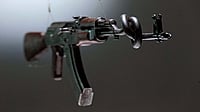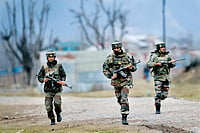The opening of the Zojila Pass to Ladakh heralds the arrival of summer. Attention invariably gets drawn to the Line of Control in both the Jammu and Kashmir regions where soldiers gear up to battle fresh infiltration attempts. Ladakh generally remains out of public glare but, for the army, summer is the time for furious activity in this area too. Thousands of soldiers are preparing to come down from their high-altitude posts along the India-Pakistan border. Most of them had moved up in the month of November and have spent five to seven months at heights averaging 15,000 feet. By early January, snowfall obliterates all tracks and most of the posts are cut off from the rest of the world. In a 50m by 50m area, facing temperatures that drop to -50 degrees Celsius and snowfall that touches 40 feet, theirs is the real story of courage and endurance of the Indian soldier. These men keep vigil in blizzard-like conditions, patrol in chest-deep snow and face the ever-present danger of avalanches.
As the dozers and snow-cutters clear Zojila, thousands of vehicles are getting ready for what’s perhaps the world’s largest logistics exercise. Everything required for the soldiers in Ladakh, for all winter, has to be transported in the summer months—almost two lakh tonnes of supplies, from toothbrush to salt and pepper to construction material. Drivers will be on the road daily, sleeping in different transit camps and averaging 20,000 km before the passes close. As tonnes of stores are dropped off at bases in Kargil and Leh, the task is only half done. Mules and porters pick up the load and walk on difficult paths to get it up to the soldiers manning the forward posts.
The air force plays a crucial role in the logistics. Heavy lift aircraft bring in essential items and ferry out soldiers on leave. This carries on throughout the year, and the sight of a C-17 Globemaster landing at Leh in winter is a huge morale-booster for soldiers who know this is the only way out on urgent leave. Helicopters, both of the army and air force, fly from morning to evening, at the limits of both human and machine tolerance, dropping supplies to posts in Siachen. Posts like Sonam, where Hanumanthappa scripted a historical saga of endurance by surviving six days under 35 feet of ice.
Fresh vegetables are a rarity in these parts. Some helicopter sorties carry fruits and vegetables bought in Chandigarh. Mostly, tinned meats and vegetables in retort pouches are the regular diet. Keeping healthy is critical because the only way out is by helicopters. Often, casualties have to be winched up to a hovering helicopter as the smaller posts do not have helipads for landing. In this unforgiving environment, mental strength is the key to survival. These thousands will not get any bravery awards but they define how the Indian army soldiers defend the nation’s borders.























